
Page 2
Vatamiga-Jataka
By a bait of honeyed grass a wild antelope is lured by slow degrees into a palace.
Pictured by: PongPang
Coloured by : Mint, PongPang

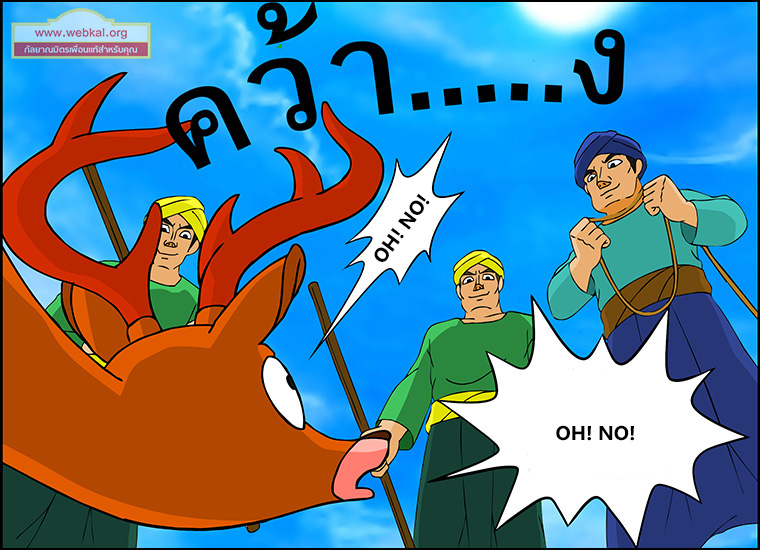
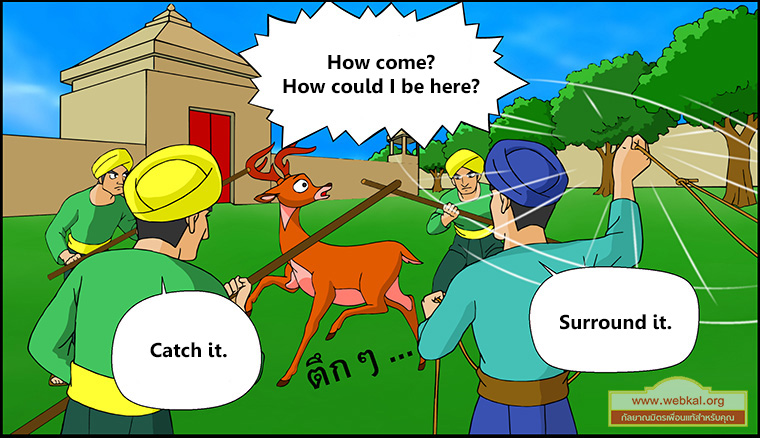
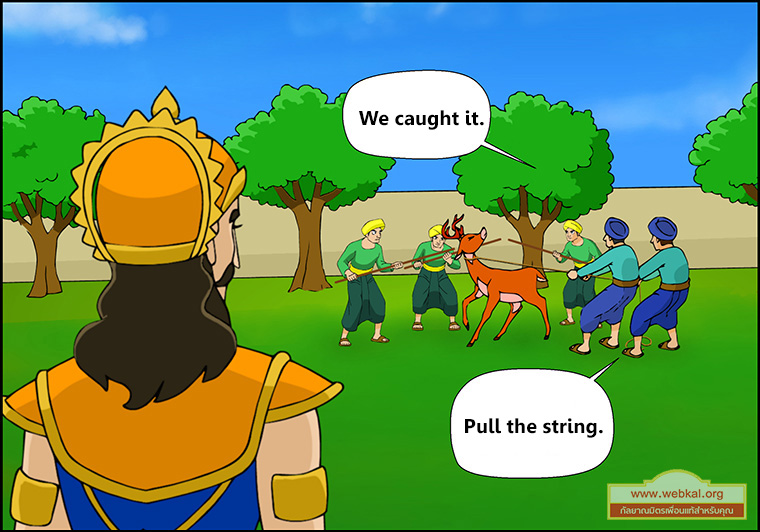


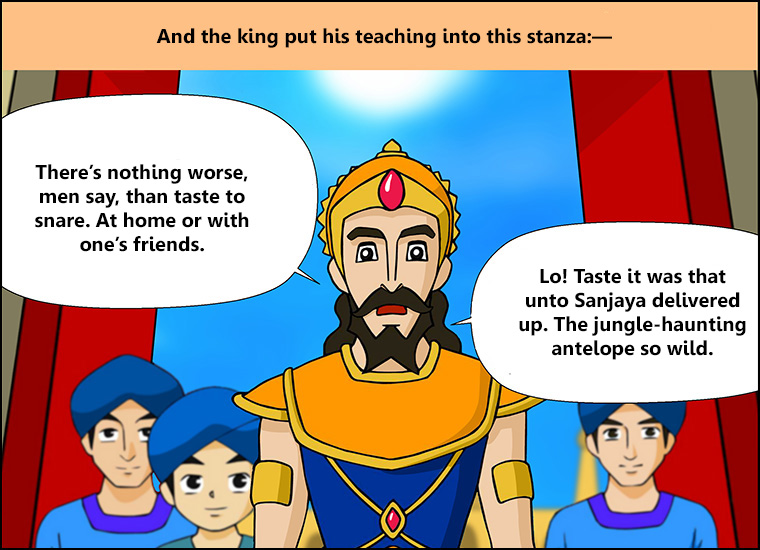
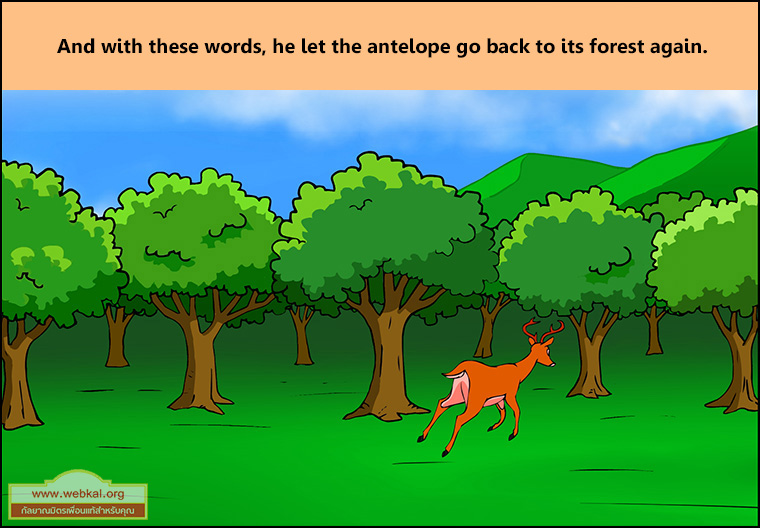
Vatamiga-Jataka
By a bait of honeyed grass a wild antelope is lured by slow degrees into a palace.
The place where the story was told
This story was told by the Lord Buddha while was dwelling at Jetavana Monastery, the city of Savatthi.
The origin of Jataka
Tradition says that, while the Lord Buddha was dwelling at the bamboo grove near the city of Rajagaha, the scion of a wealthy house, Tissa-kumara by name, coming one day to the bamboo grove and there hearing a discourse from the Lord Buddha, wished to join the Order but, being refused because his parents would not give their consent, obtained their consent by following Venerable Rattha-pala’s example and refusing food for seven days, finally took the vows with the Lord Buddha.
About a fortnight after admitting this young man, the Enlightened One repaired from the bamboo grove to Jetavana, where the young nobleman undertook the Thirteen Obligations and passed his time in going his round for alms from house to house, omitting none. Under the name of Venerable Tissa direct-alms the less, he became as bright and shining a light in Buddhism as the moon in the vault of heaven.
A festival having been proclaimed at this time at Rajagaha, the Venerable’s mother and father laid in a silver casket the trinkets he used to wear as a layman and took it to heart, bewailing thus,—
‘At other festivals our son used to wear this or that bravery as he kept the festival and he, our only son, has been taken away by the sage Gotama to the town of Savatthi. Where is our son sitting now or standing?’
Now a slave girl who came to the house, noticed the lady of the house weeping and asked her why she was weeping. The lady told her all. The slave girl said she would fetch them their son if they agreed to give her authority and expenses. The lady assented to the proposal and despatched her with a large following.
So away the girl rode in a palanquin to Savatthi where she took up her residence in the street which the Venerable used to frequent for alms.
Surrounding herself with servants of her own and never allowing the Venerable to see his father’s people about, she watched the moment when the Venerable entered the street and at once bestowed on him an alms of victual and drink.
And when she had bound him in the bonds of the craving of taste, she got him eventually to seat himself in the house, till she knew that her gifts of food as alms had put him in her power.
Then she feigned sickness and lay down in an inner chamber. In the due course of his round for alms at the proper time, the Venerable came to the door of her house and her people took the Venerable’s bowl and made him sit down in the house.
When he had seated himself, he said, ‘Where is the lay sister?’ ‘She’s ill, sir; she would be glad to see you.’
Bound as he was by the bonds of the craving of taste, he broke his vow and obligation and went to where the woman was lying.
Then she told him the reason of her coming and so wrought on him that, all because of his being bound by the bonds of the craving of taste, she made him forsake the monkhood; when he was in her power, she put him in the palanquin and came back with a large following to Rajagaha again.
All this was noised abroad. Sitting in the hall of truth, the monks discussed the matter, saying, ‘Sirs, it is reported that a slave girl has bound in the bonds of the craving of taste and has carried oft’, the Venerable Tissa the less, called direct-alms.’ Entering the hall, the Lord Buddha sat down on his jeweled seat and said, ‘What, monks, is the subject of discussion in this conclave?’ They told him the incident.
‘Monks,’ said he, ‘this is not the first time that, in bondage to the craving of taste, he has fallen into her power; in bygone days too he fell into her power in like manner.’ And so saying, he told this story of the past.
The story of Jataka
Once on a time, in the king Brahmadatta’s pleasaunce where the gardener was Sanjaya, a wild antelope wandered in the place and fled away at the sight of Sanjaya. The gardener let it go without terrifying the timid creature. After several visits, the antelope used to roam about in the pleasaunce.
Now the gardener was in the habit of gathering flowers and fruits and taking them day by day to the king. Said the king to him one day, ‘Have you noticed anything strange, friend gardener, in the pleasaunce?’ ‘Only, sir, that a wild antelope has come about the grounds.’ ‘Could you catch it, you think?’ ‘Oh, yes; if I had a little honey, I’d bring it right into your majesty’s palace.’
The king ordered the honey to be given to the man and he went off with it to the pleasaunce, where he first anointed with the honey the grass at the spots frequented by the antelope and then hid himself. When the antelope came and tasted the honeyed grass it was so snared by the lust of taste that it would go nowhere else but only to the pleasaunce.
Growing familiar with the sight of the gardener, it gathered confidence and gradually came to eat grass from his hand.
He, noting that the creature’s confidence had been won, first strewed the path as thick as a carpet with broken boughs; then tying a gourd full of honey on his shoulder and sticking a bunch of grass in his waist-cloth, he kept dropping wisps of the honied grass in front of the antelope till at last he got it right inside the palace.
At sight of men, the antelope, in fear and trembling for its life, dashed to and fro about the hall and the king coming down from his chamber above, seeing the trembling creature, said,
‘So timid is the wild antelope that for a whole week it will not revisit a spot where it has so much as seen a man and if it has once been frightened anywhere, it never goes back there again all its life long. Yet, ensnared by the lust of taste, this wild thing from the jungle has actually come to a place like this. Truly, my friends, there is nothing viler in the world than this lust of taste.’
And he put his teaching into this stanza:—
There’s nothing worse, men say, than taste to snare, at home or with one’s friends. Lo! Taste it was that unto Sanjaya delivered up. The jungle-haunting antelope so wild.
And with these words he let the antelope go back to its forest again.
The revealing of the identities
When the Lord Buddha had ended his lesson and had repeated what he had said as to that monks having fallen into that woman’s power in bygone days as well as in the present time, he shewed the connexion and identified the birth, by saying:
‘In those days this slave girl was Sanjaya, direct-alms the less was the wild antelope and I myself was the King of Benares.’
What are learned from the story:
1. People are likely susceptible to attachments seen by the wise as harm, for instance:
a. Attachment to abode: the cause of impeding people from continuing to learn more new things as they refuse going out of their comfort zone to experience and enhance their horizon. It is also the cause of impeding the development of the community in the case that their abode sat obstruct the infrastructure progress and refuse to co-operate.
b. Attachment to company: most of this type of people is lack of self-confidence so they are heavily dependent to others; being a carried passenger; the worst, if they associate with the fool, their lives are ruined by their association.
c. Attachment to taste: the cause of spending extravagantly for food, gaining excessive weight and obesity; the worst case if a person attaches to the taste of addictive drugs or liquor, their lives are ruined.
2. For the meditator who attaches to taste, the harmful consequences are:
a. Having a sleepy feeling during meditation hours
b. Wasting too much time for cooking many food and being indulged in eating
c. Losing the concentrated mind into hankering about consumption
d. Falling from the noble path as the case of Venerable Tissa above so devotees should not criticize the monk who refuses their invitation of a luxurious meal at their home for the monk fear of easily being ensnared in tastes.
The End